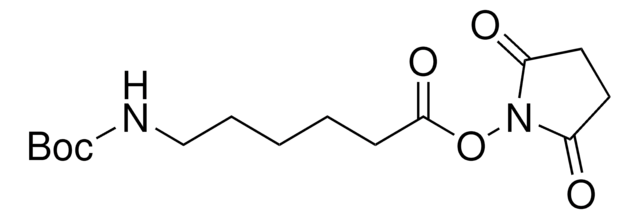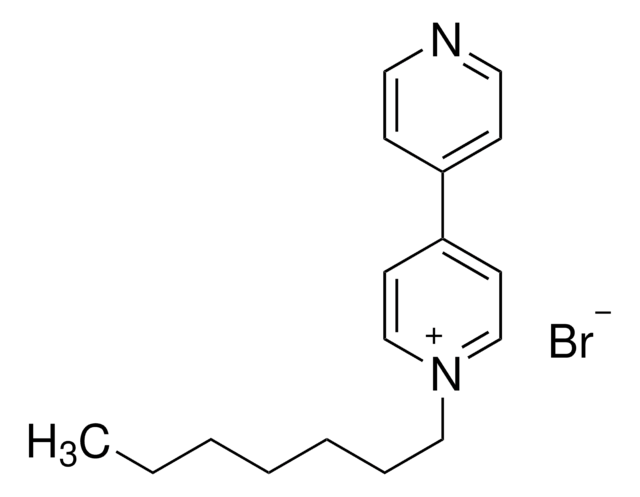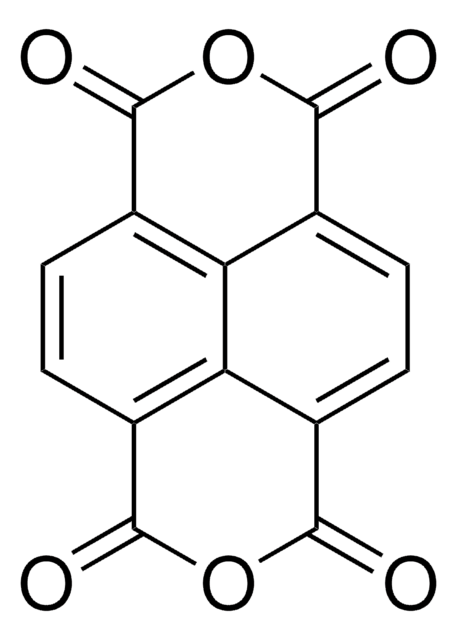04067
Fmoc-6-Ahx-OH
≥97.0% (HPLC)
Synonym(s):
6-(Fmoc-amino)caproic acid, 6-(Fmoc-amino)hexanoic acid
Sign Into View Organizational & Contract Pricing
All Photos(1)
About This Item
Empirical Formula (Hill Notation):
C21H23NO4
CAS Number:
Molecular Weight:
353.41
Beilstein:
5883220
MDL number:
UNSPSC Code:
12352209
PubChem Substance ID:
NACRES:
NA.26
Recommended Products
Quality Level
Assay
≥97.0% (HPLC)
form
powder
reaction suitability
reaction type: Fmoc solid-phase peptide synthesis
color
white
application(s)
peptide synthesis
functional group
Fmoc
storage temp.
2-8°C
SMILES string
OC(=O)CCCCCNC(=O)OCC1c2ccccc2-c3ccccc13
InChI
1S/C21H23NO4/c23-20(24)12-2-1-7-13-22-21(25)26-14-19-17-10-5-3-8-15(17)16-9-4-6-11-18(16)19/h3-6,8-11,19H,1-2,7,12-14H2,(H,22,25)(H,23,24)
InChI key
FPCPONSZWYDXRD-UHFFFAOYSA-N
Storage Class Code
11 - Combustible Solids
WGK
WGK 3
Flash Point(F)
Not applicable
Flash Point(C)
Not applicable
Personal Protective Equipment
dust mask type N95 (US), Eyeshields, Gloves
Choose from one of the most recent versions:
Already Own This Product?
Find documentation for the products that you have recently purchased in the Document Library.
Customers Also Viewed
Jing Han et al.
Molecular pharmaceutics, 15(7), 2840-2856 (2018-05-26)
GLP-1 analogs suffer from the main disadvantage of a short in vivo half-life. Lithocholic acid (LCA), one of the four main bile acids in the human body, possesses a high albumin binding rate. We therefore envisioned that a LCA-based peptide
Sergej Karel et al.
Carbohydrate polymers, 201, 300-307 (2018-09-23)
New materials based on molecules naturally occurred in body are assumed to be fully biocompatible and biodegradable. In our study, we used hyaluronic acid (HA) modified with peptides, which meet all this criterion and could be advantageously used in tissue
Christos Kontos et al.
Nature communications, 11(1), 5981-5981 (2020-11-27)
Targeting a specific chemokine/receptor axis in atherosclerosis remains challenging. Soluble receptor-based strategies are not established for chemokine receptors due to their discontinuous architecture. Macrophage migration-inhibitory factor (MIF) is an atypical chemokine that promotes atherosclerosis through CXC-motif chemokine receptor-4 (CXCR4). However
Our team of scientists has experience in all areas of research including Life Science, Material Science, Chemical Synthesis, Chromatography, Analytical and many others.
Contact Technical Service












